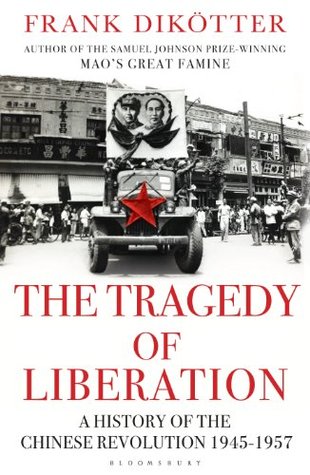More on this book
Community
Kindle Notes & Highlights
Read between
July 18 - August 7, 2018
Few ever made it past the communist lines. Lin Biao had placed a sentry every 50 metres along barbed wire and trenches 4 metres deep. Every exit was blocked. He reported to Mao: ‘We don’t allow the refugees to leave and exhort them to turn back. This method was very effective in the beginning, but later the famine got worse, and starving civilians would leave the city in droves at all times of day and night, and after we turned them down they started gathering in the area between our troops and the enemy.’ Lin described how desperate the refugees were to be allowed through communist lines,
...more
This highlight has been truncated due to consecutive passage length restrictions.
Hailed in China’s history books as a decisive victory in the battle of Manchuria, the fall of Changchun came at huge cost, as an estimated 160,000 civilians were starved to death inside the area besieged by the communists. ‘Changchun was like Hiroshima,’ wrote Zhang Zhenglong, a lieutenant in the People’s Liberation Army who documented the siege. ‘The casualties were about the same. Hiroshima took nine seconds; Changchun took five months.’13
But everybody in Beijing knew what had happened to Changchun, turned into a ‘city of death’ by the very general who was now camping outside the city walls. Fu Zuoyi fell into a depression, tormented by the prospect of seeing Beijing, the cultural heart of China, desecrated for no good reason. At first he asked Chiang for permission to resign, but when the Generalissimo refused, he resumed the secret negotiations he had opened with the People’s Liberation Army through his daughter, who was a member of the communist party. After a forty-day siege, a surrender document was signed on 22 January
...more
Fighting in the countryside was ferocious, as both sides battled for the country’s heartland. Nationalists and communists deployed tanks and heavy artillery, while government planes controlled the skies, using cloudless days and nights to wreak havoc on the enemy. Ancient towns with moats and walls were pounded. Orange flashes of shell explosions came from villages caught in the crossfire, leaving behind nothing but wrecked houses, smouldering amid fields sown with winter wheat. In a village just north of Caolaoji, everything had been set ablaze by mortar shells. Amid the smell of burned
...more
This highlight has been truncated due to consecutive passage length restrictions.
A powerful propaganda machine presided over by Zhou Enlai mercilessly exploited every failing of the nationalist regime. In this war of images, the communists managed to project a vision of democracy and social reform, largely because nobody besides a few visiting journalists on guided tours ever managed to spend time in their home territory. But, most of all, people were tired of war. After more than a decade of fear and violence, they craved peace at any cost, even under communism.
On 23 April columns of PLA soldiers entered the city, sweating in their padded uniforms. The following day they could be seen sitting in orderly formations on their sleeping bags along the pavements, listening to political instructions from their cadres or singing revolutionary songs. Curious crowds gathered to stare at them or bring them hot water, poured into the mugs the soldiers carried on their belts. Neatly dressed students – earnest young men and women – came out of their dormitories, cheering the arrival of the troops, although most of the soldiers ignored them: they were worlds apart.
...more
After a weary wait of several weeks, Shanghai fell to the communists on 25 May. Barely a shot was fired, as the business community and the triads had quietly switched sides. The nationalists were seen in full retreat, some of the troops marching almost in parade formation, others streaking through the city in terror and confusion, caked with mud from the battlefield. In the red-light district, fleeing soldiers desperately searched the shops for second-hand clothing; the streets were strewn with discarded uniforms.


